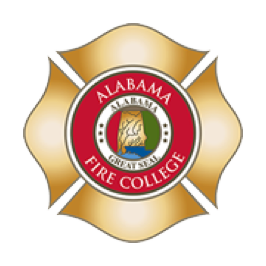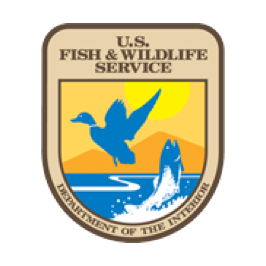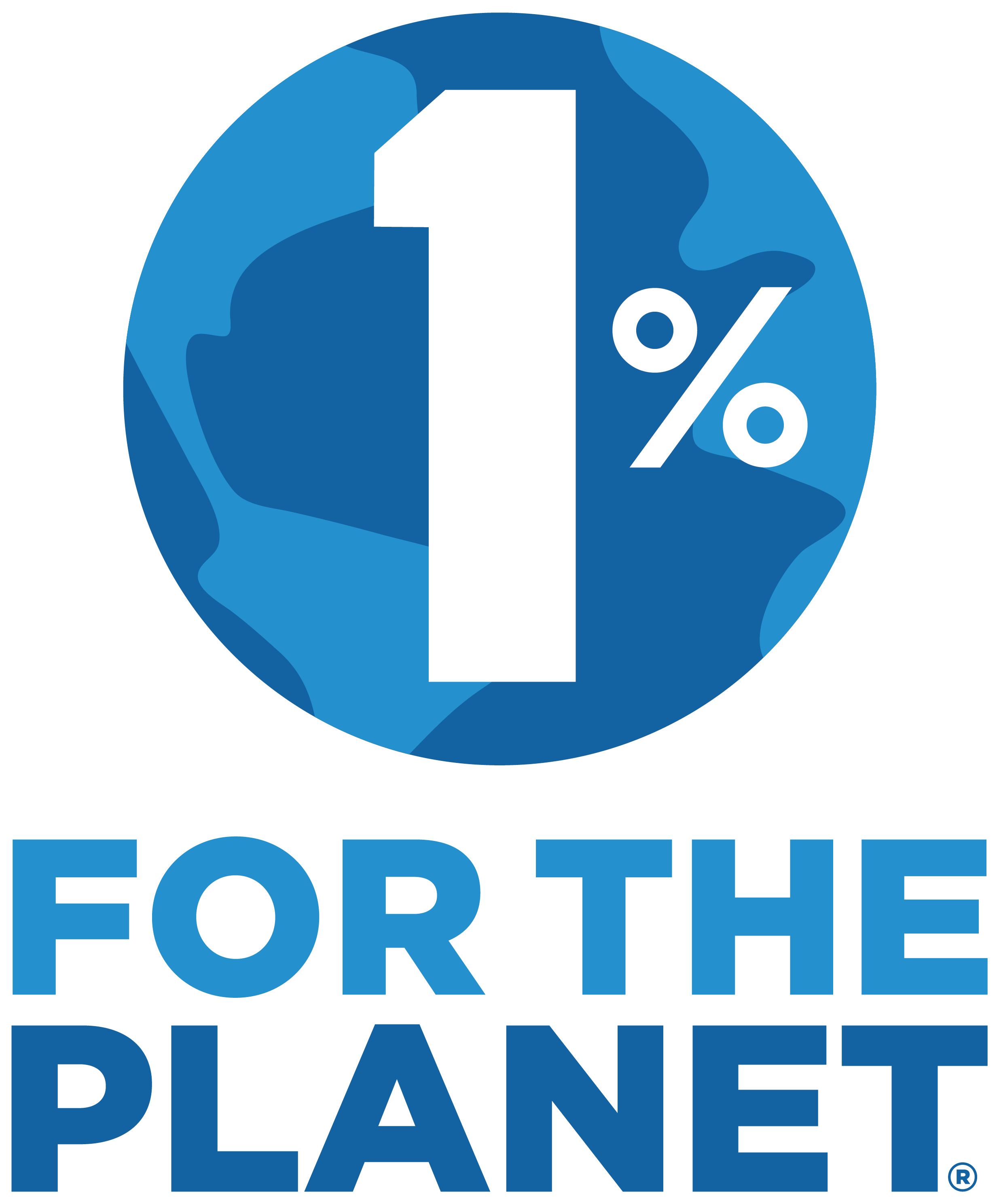Winter 2022 – From The Eagle’s Nest Newsletter
From the Eagle’s Nest
Winter 2022
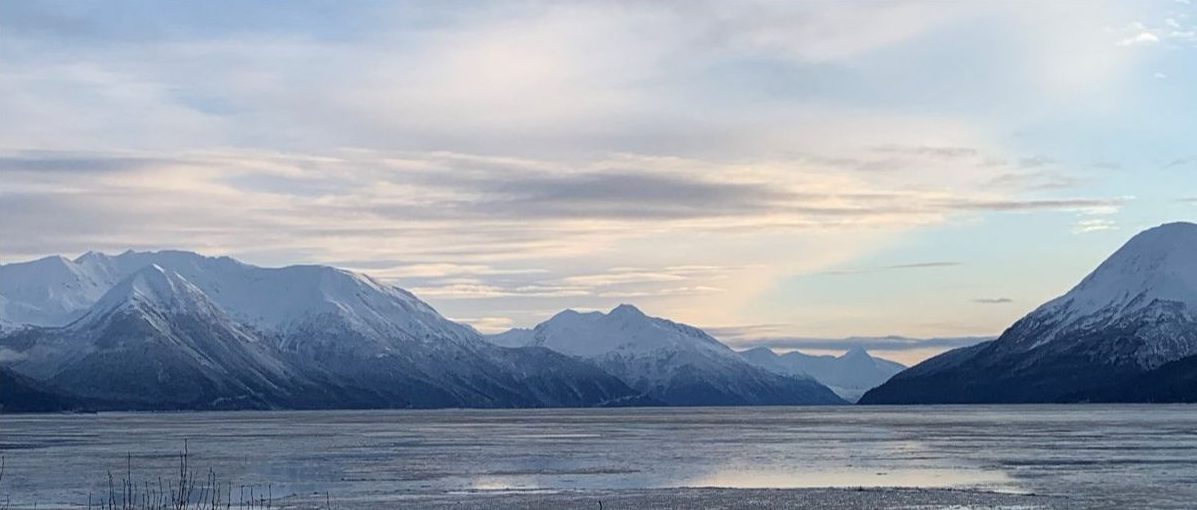
Anchorage, AK. Photo courtesy of Julie Thorstenson.
Featured Articles
Message from the President
Message from the Executive Director
COVID in Deer: Guidelines for Risk Reduction & New Monitoring Program
Capacity Building and Enhancement of Tribal Wild Foods Management Programs
Southwest Wildlife Water Resources Initiative
Meet Our New Wildlife Connectivity Coordinator
Upcoming Events: Great Plains Regional & 39th Annual National Conference
Upcoming Webinars & Trainings: Professional Development Series & Hazardous Materials Awareness
Education Updates
CLEO Updates
Fish & Wildlife News: Invasive Species, Wildlife Disease, and Endangered Species
We are Hiring!!!
Membership Updates
Message from the President
Happy New Year! The Society is off and running into 2022. We have jobs advertised and we are submitting funding applications for additional positions and for the national youth practicum. I’m looking forward to the professional development training that will start soon. This is a result of providing what the membership requested. We are listening and our awesome staff is planning and getting it done.
Our prayers have been answered here in the west; we have snow in the mountains. It’s going to be an exciting spring as we watch the water flow off the Sierra mountains. We have record setting snowpacks in the different watersheds; our Walker River watershed is at 222 percent of normal, the most we’ve seen in my lifetime. That means we need to plan for flooding. On the flip side, our Walker Lake is thirsty for water; we just need to make sure it gets there.
Continued prayers for all who are suffering and dealing with this pandemic. Our reservation and many others are seeing great increases in positive cases. My heart breaks to see families and relatives deal with loss. We also see how resilient we are during crisis. Thanks to our traditional medicines and prayers: we’ll get through this together.
Have a great year and work hard and enjoy what you do. Get involved with the Society and help us to be an organization that educates tribes and others on the many fish and wildlife issues. I have a front row seat to our evolving Society that I’m very proud of.
Respectfully… Elveda Martinez
Message from the Executive Director
Happy New Year! Although it’s starting to feel like the same year over and over. Despite all the challenges we have all faced over the past two years, I’m very excited for all NAFWS’ has accomplished and what the future holds.
The last quarter of 2021 was very productive for NAFWS as we held our National Annual Conference, held two Board of Directors’ meetings; continue to see growth in funding, added partners and staff, and set our goals for 2022.
Our National NAFWS Annual Conference was held October 4 – 7, 2021 at the Northern Quest Resort and Casino in Spokane, WA. I want to personally thank the Kalispel Tribe of Indians for their hospitality and the wonderful buffalo stew. A special shout out to Deane Osterman, Ray Entz, Joe Maroney, and Kalispel Natural Resources Department for all their help and support. Due to travel restrictions, we had a smaller than usual crowd, but all the sessions were full, and participants were very engaged. We hosted several workshops, including climate adaptation, chronic wasting disease sampling training, and a fisheries eDNA workshop. We also had a productive Board of Directors’ meeting and National Business meeting, approving many actions and five resolutions.
A lot has happened since Recovering America’s Wildlife Act (Recovering) was reintroduced in April 2021. Recovering (HR 2773) has 143 cosponsors and for the first time there is also a Senate Recovering bill (S 2372) with 32 cosponsors. There is widespread bipartisan support for the bill as well as extensive Tribal support (50 Tribal letters of support representing 80 Tribes during the 116th Congress). The Senate Committee on Environment and Public Works held a hearing on Recovering December 8, 2021. A letter of support was submitted to the Senate signed by 80 Tribes/Tribal organizations and consortia representing 115 Tribal Nations. NAFWS recently reconfirmed our support through a resolution to support dedicated federal funding to recover fish & wildlife at our 2021 National Annual Business Meeting.
We completed the data collection for our Tribal Fish and Wildlife Program Status survey in December. Once again, staff met prior to the December Board of Directors’ meeting and developed a Strategic Operations Plan (SOP) for 2022. The preliminary results of the survey helped establish regional goals and programming needs as well as informed the 2022 National Initiatives. The Board of Directors approved the following as the NAFWS 2022 National Initiatives:
- Recovering America’s Wildlife Act
- Tribal Wildlife Corridors/Connectivity
- Tribal Conversation Law Enforcement Program Enhancement
- Climate Change/30×30 Initiative
- Wildlife Health
Please watch our website as we continue to add resources about our National Initiatives along with several National Projects including:
- Chronic Wasting Disease/Wildlife Disease
- Invasive Species
- Surveys/Data Collection
- Working group for Tribal fish and wildlife program establishment and development
- Electronic toolkit
- Tribal Engagement/Involvement in State Wildlife Action Plans
- NAFWS HuntSafe Program
We are looking forward to several events already in planning, such as the Great Plains Regional Conference, April 6 & 7 in Deadwood, SD, and the 39th Annual NAFWS National Conference May 9-12, 2022 in Miami, FL. Along with events we are working on finalizing our Tribal Fish and Wildlife Status Report for Tribes in the Lower 48 States. This report will help serve as a base for future surveys and hopefully provide a better understanding of the reality of Tribal Fish and Wildlife programs and their needs. We will finalize our 2021 Annual report in the upcoming months.
We ended the year on several positives, including the hiring of our newest team member, Shailyn Miller as the Wildlife Connectivity Coordinator. We are currently advertising for a Director of Programs and an Alaska Senior Tribal Climate Resilience Liaison. We anticipate continuing to increase our staff in 2022 which in turn will help us better serve our membership and our mission to Assist Native American and Alaska Native Tribes with the conservation, protection, and enhancement of their fish and wildlife resources.
It has not been an easy time and we continue to pray for all, that we may once again meet in person without fear, to discuss the fantastic work you all are doing in Indian Country. As always, if you have ideas for the NAFWS, please contact me or your regional director(s).
My thoughts and prayers to all,
Julie Thorstenson, PhD
Executive Director
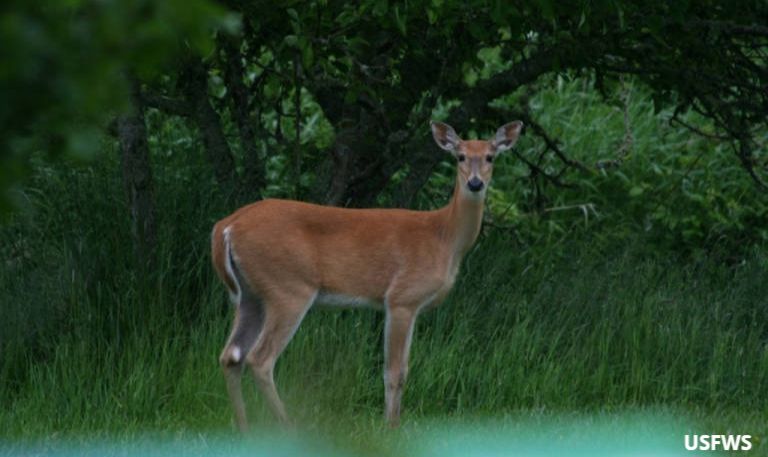
COVID in Deer: Guidelines for Risk Reduction & New Monitoring Program
SARS-CoV-2, the virus that causes COVID-19 has been identified in white-tailed deer populations by a team of researchers from Pennsylvania State University (Kuchipudi et al., 2021). Despite the low risk of COVID spread from wildlife to humans, there are proactive steps you can take to reduce your risk and to avoid infecting local wildlife populations. Many of these steps will also minimize risks of exposure to and spread of other wildlife diseases (e.g., chronic wasting disease).
- Do not feed wildlife or touch droppings
- Do not approach or touch a sick or dead animal
- Do not allow contact between wildlife and pets
- Get vaccinated. The highest risk of infection is still other people, especially unvaccinated people. Vaccinations protect you, your community, and local wildlife.
- Additional guidance for hunters and biologists is available here.
Monitoring Program
USDA APHIS has invited Tribes to join in monitoring efforts for SARS-CoV-2 in white-tailed deer populations. The phased, multi-year study will examine impacts of COVID in white tailed deer populations to human and animal health. Tribal, federal, and state agencies will collect nasal swabs and Nobuto strip blood samples from deer harvested by hunters and other available sampling opportunities. Through the American Rescue Plan, APHIS will provide training, sampling kits, shipping materials, and funding for personnel time, vehicle use, administrative costs, and other expenses. Learn more about the program.
Contact Tim Linder ([email protected]) or Julianna Lenoch ([email protected]) for more information and to participate.
Capacity Building and Enhancement of Tribal Wild Foods Management Programs
October 4, 2021 – The Native American Fish and Wildlife Society (NAFWS) has entered into a contract with ARED, LLC, funded by the Bureau of Indian Affairs. ARED is a small consulting company founded by Brian Ashton. Brian was raised and lived most of his life in rural Alaska and has a strong passion for assisting communities with creating their own strategic plans for how to thrive into the future. ARED has been involved in salmon enhancement and restoration and has demonstrated unique talents and scope of knowledge to assist Tribes in enhancing their position for management of historic wild salmon subsistence resources.
In this capacity working with NAFWS and Tribal Governments within the United States, ARED will provide consulting for capacity building and enhancement of Tribal Wild Foods Management programs that aim to benefit Tribes through an increased management role, allocation, and access to subsistence trust resources. This agreement will have special emphasis and focus on strategic planning and subsequent actions for subsistence resource management, particularly within the realm of fisheries. Contact Brian Ashton ([email protected]) for more information.
Southwest Wildlife Water Resources Initiative
Tribes in the southwest region have until Jan 31, 2022, to sign up for our Southwest Wildlife Water Resources Initiative. This project aims to determine the current state of Tribes’ water resources, highlight ongoing and future projects, and gauge the need for funding for wildlife water resources. We are seeking 10-15 shovel ready projects in the southwest region to demonstrate this need.
Please join the Native American Fish & Wildlife Society (NAFWS) along with our Southwest Wildlife Water Project consultant, Deb Anyaibe of Kaleidoscope Consulting as we host a 2nd listening session on Friday, January 28, 2022 from 10:30 a.m. to 12:00 p.m. MT. Contact Deb Anyaibe (505-903-4814, [email protected]) for more information.
Meet Our New Wildlife Connectivity Coordinator
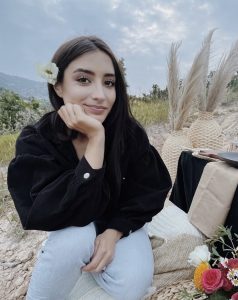
Shailyn Miller is joining the NAFWS Team in 2022 as the Wildlife Connectivity Coordinator (WCC). Shailyn is a member of the Chippewa-Cree Tribe of the Rocky Boy’s Indian Reservation, Montana. She graduated from Montana State University-Bozeman in 2019 with a bachelor’s degree in Fish and Wildlife Ecology & Management. Since moving to Denver, she has worked for Colorado Parks & Wildlife, USDA Forest Service, and an ecological consulting firm. As the WCC, Shailyn will work with Tribes to support habitat connectivity and migrating wildlife management.
Upcoming Events
Conferences
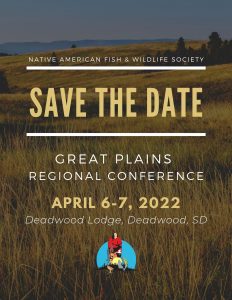 Great Plains Regional
Great Plains Regional
The 2022 Great Plains Regional Conference is scheduled for April 6-7 at the Deadwood Lodge in Deadwood, SD. Reserve rooms as soon as possible by calling 877-393-5634 and using the code GPNFW to receive a discounted rate. Submit abstracts for oral presentations and student posters and nominations for regional awards by February 4th at 10PM ET.
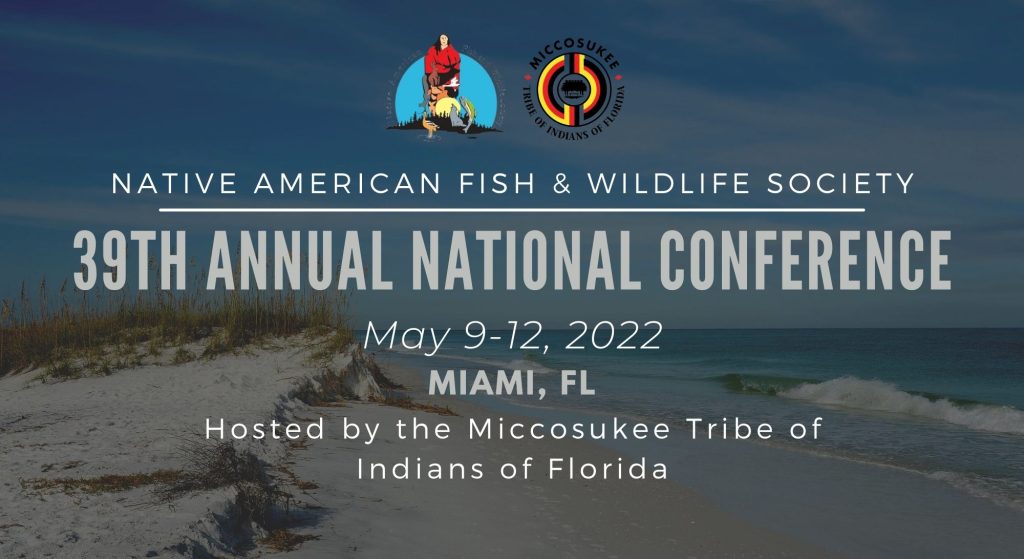
39th Annual National Conference
The 39th Annual National Conference is rapidly approaching. The conference will be a hybrid event held May 9-12, 2022 hosted by the Miccosukee Tribe of Indians of Florida at Miccosukee Resort & Gaming in Miami, FL with an option to attend many of the conference events virtually. The conference will be held May 9-12, 2022, hosted by the Miccosukee Tribe at Miccosukee Resort & Gaming in Miami, FL. Submit abstracts, National Award Nominations, and Memorial Requests by March 18th at 10PM (MT).
Webinars & Trainings

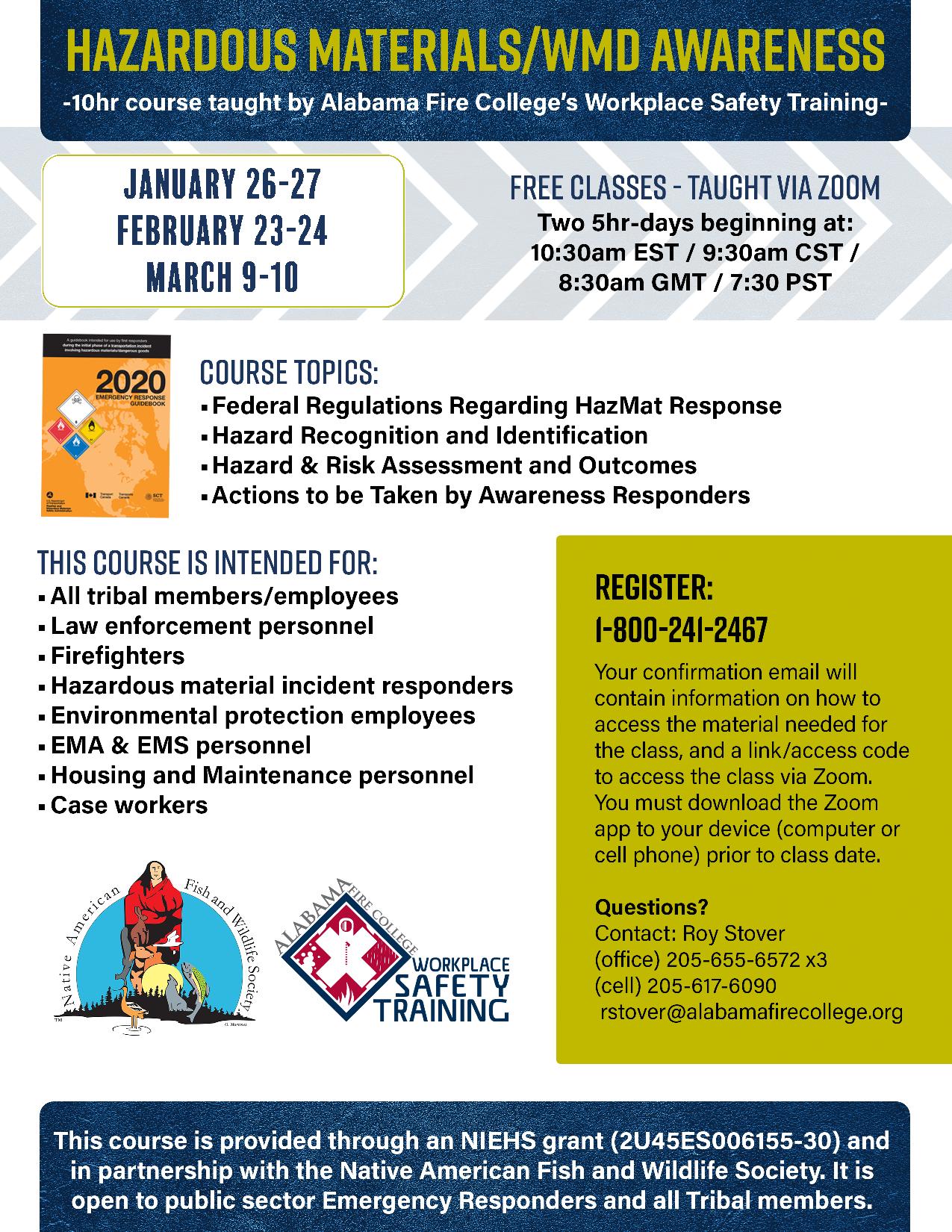
Professional Development Webinar Series
In 2022, we are launching a Professional Development Webinar Series. The first of these FREE monthly webinars on January 20th at 2PM MT will introduce NAFWS and discuss goal setting. Students and professionals at any level are welcome. The first five people to register will receive a 2022 Planner! See the full webinar schedule.
Hazardous Materials/WMD Awareness Courses
NAFWS is hosting three FREE Hazardous Materials Awareness courses taught by the Alabama Fire College. The courses are two 5hr days on Jan 26-27, Feb 23-24, and Mar 9-10. All Tribal members and employees are welcome to attend.
Program Updates
Education Update
Ashley Carlisle, Education Coordinator
Happy New Year, we are thankful for 2021 and are looking forward to 2022!
In early November, Education Coordinator Ashley Carlisle presented and attended the 2021 Wildlife Society Virtual Conference. The conference had a great turnout and was informative. Ashley presented on a panel session titled, Moving Forward: Expanding Inclusivity, Advocacy, and Allyship on Wednesday, November 3rd. She presented and shared information about NAFWS, more specifically about the internship program, and gave guidance in recruitment and supervising college students.
The NAFWS has awarded three college students with regional scholarships to aid in their educational endeavors, see below to meet our scholars.
Reese Shippentower, Pacific Region, Confederated Tribes of Umatilla Indian Reservation, Oregon State University
 Reese Shippentower is a member of the Confederated Tribes of Umatilla Indian Reservation (CTUIR). He grew up on the reservation located in eastern Oregon. The youngest of three with two older sisters and has three nephews, and two nieces. Reese is an avid fisherman and enjoys hunting, camping, and spending time with family and friends. He worked as a Wildland firefighter for three summers and just got done working as a fish technician for CTUIR. Reese completed a transfer degree at Blue Mt Community College and is currently attending Oregon State University majoring in Fisheries and Wildlife Sciences. His career goal is to become a biologist and contribute to his tribe’s Natural Resource goals.
Reese Shippentower is a member of the Confederated Tribes of Umatilla Indian Reservation (CTUIR). He grew up on the reservation located in eastern Oregon. The youngest of three with two older sisters and has three nephews, and two nieces. Reese is an avid fisherman and enjoys hunting, camping, and spending time with family and friends. He worked as a Wildland firefighter for three summers and just got done working as a fish technician for CTUIR. Reese completed a transfer degree at Blue Mt Community College and is currently attending Oregon State University majoring in Fisheries and Wildlife Sciences. His career goal is to become a biologist and contribute to his tribe’s Natural Resource goals.
Molly Thomas, Great Lakes, Sault Ste Marie Tribe of Chippewa Indians, Lake Superior State University
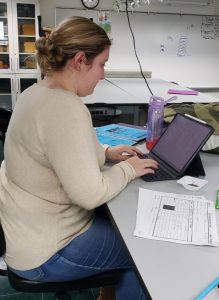 My name is Molly Thomas, and I am from Hubbard Lake, Michigan. I grew up with 3 brothers and a love for nature. Ever since I was little, I loved to travel and hike, and I knew I wanted to work with the environment. I was in 4H and a FFA officer in my high school years and an early college student. I graduated with a associate in science at my local Alpena Community College. I am now a freshman at Lake Superior State University going for environmental science and a minor in chemistry. I am looking forward to doing more outside as this is my first semester of getting my hands dirty with field work!
My name is Molly Thomas, and I am from Hubbard Lake, Michigan. I grew up with 3 brothers and a love for nature. Ever since I was little, I loved to travel and hike, and I knew I wanted to work with the environment. I was in 4H and a FFA officer in my high school years and an early college student. I graduated with a associate in science at my local Alpena Community College. I am now a freshman at Lake Superior State University going for environmental science and a minor in chemistry. I am looking forward to doing more outside as this is my first semester of getting my hands dirty with field work!
Christian Stewart, Northeast Region, Chickahominy Tribe, Virginia Technical University
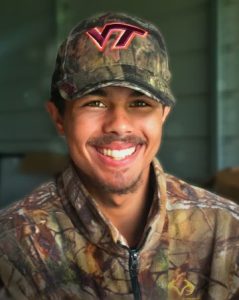 My name is Christian Wade Stewart, and I would like to express how grateful I am for being a recipient of the NAFWS scholarship. It is because of generous people and organization such as this that I am able to continue my education. I am a proud member of the Chickahominy Tribe, located in southeastern Virginia. I am 19 years of age and I enjoy hunting, fishing, and any other activity that includes the outdoors. I am coming up on the Spring semester of my sophomore year. My expected graduation is May 2024. Hopefully I can use my education and experience to invest into other communities with children who aspire to go to college, just as I did. Once again, thank you so much for selecting me as a recipient and I hope you can help others just as you have done for me.
My name is Christian Wade Stewart, and I would like to express how grateful I am for being a recipient of the NAFWS scholarship. It is because of generous people and organization such as this that I am able to continue my education. I am a proud member of the Chickahominy Tribe, located in southeastern Virginia. I am 19 years of age and I enjoy hunting, fishing, and any other activity that includes the outdoors. I am coming up on the Spring semester of my sophomore year. My expected graduation is May 2024. Hopefully I can use my education and experience to invest into other communities with children who aspire to go to college, just as I did. Once again, thank you so much for selecting me as a recipient and I hope you can help others just as you have done for me.
We are in the heights of planning for 2022 by establishing host sites and dates for the 2022 National SYP, organizing, and producing operational manuals, and reaching out to partners. The 2022 National SYP dates have been established and are scheduled for July 9 – 16, 2022 at the YMCA of the Rockies (Estes Park, CO) and Colorado State University’s Mountain Campus. Applications will open at the end of January 2022.
Another program in the planning process is our internship program. We hope to welcome interns to participate in our eight-week internship program from June – August 2022. Applications will open either at the end of January or early February 2022.
One main event to keep an eye out for is our Professional Development Webinar Series that will be launching in 2022! The first webinar will be on Thursday, January 20th at 2 pm MT and will focus on providing information/introduction to the NAFWS and discussing goal setting. The first five people to register and attend the webinar will receive a 2022 Planner. See below for details on the webinar series, dates, topics and registration.
Conservation Law Enforcement Update
Robert Romero, CLEO Consultant
Happy New Year everyone! Here are some highlights of the CLEO program for the last quarter of 2021.
We kept rolling full steam ahead the last few months of 2021, and successfully planned and executed the NAFWS National Conference in Spokane, WA in October. This was a huge undertaking for a new staff, but in the end, we did it with the support of so many!
A total of 22 CLEOs from four different NAFWS regions were able to attend and participate in workshops and sessions during the week.
The Alabama Fire College provided an 8-hour workshop on Hazardous Materials Awareness, and other sessions included a roundtable presentation from the U.S. Fish and Wildlife Service/Office of Law Enforcement about agency structure, the Lacey Act and evidence collection, and finally the Great Lakes Drone Company taught an 8-hour course on Unmanned Aircraft Familiarization, Requirements and Use.
CLEOs participated in the 2021 National Conference Practical Pistol Competition at the Spokane Police Academy toward the end of the week. A total of 13 officers made up three individual teams for the competition. The Great Plains and Great Lakes teams each had four members, and the Southwest, Pacific and Great Plains regions formed a combined team with five members after it was voted on and unopposed by the group.
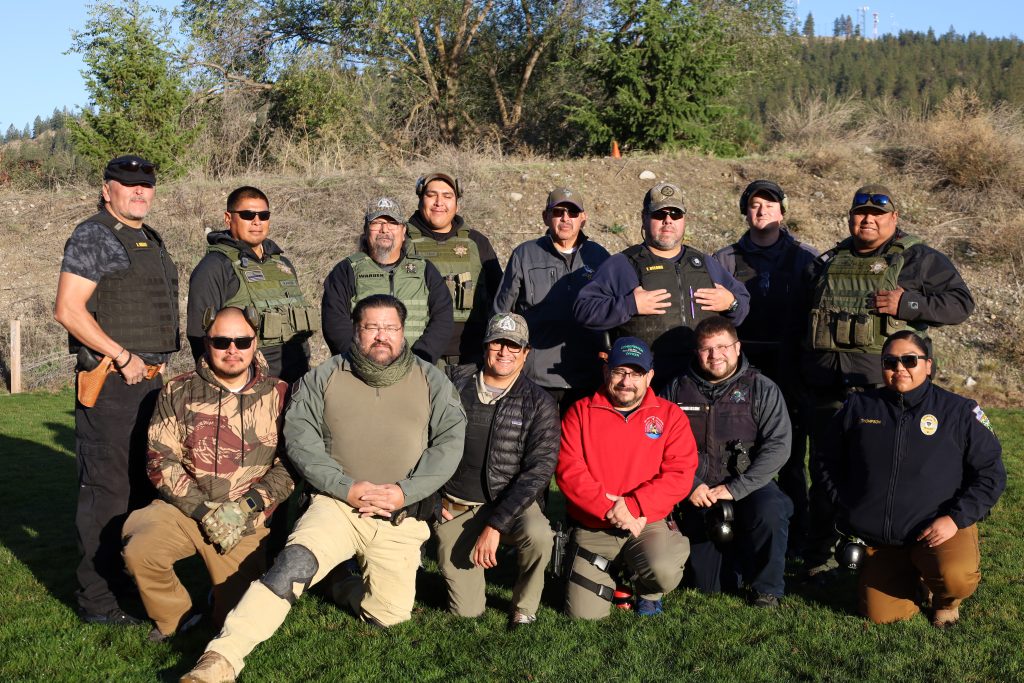
National Conference Practical Pistol Competition Shooters– Photo by NAFWS A. Richards
The Championship was awarded to the Southwest/Pacific/Great Plains team which consisted of members Zachary Ashkie, Jerrel Wilson, Charles Wilkinson, Jeremiah Dude and Alexandria Thompson who scored a total of 8000 points.
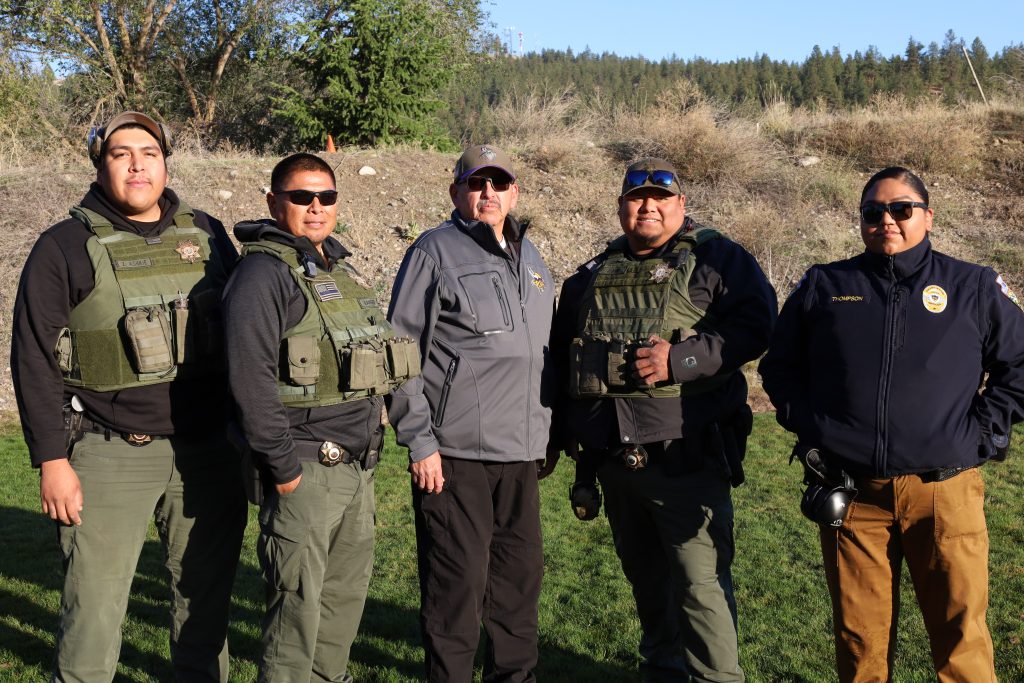
Southwest/Pacific/Great Plains Regions Shoot Team– Photo by NAFWS A. Richards
Second place was awarded to the Great Plains team whose members were Jeff Kelly, Morgan Tibbitts, Beaufort Joe and Thomas Delong and their total score was 7986 points.
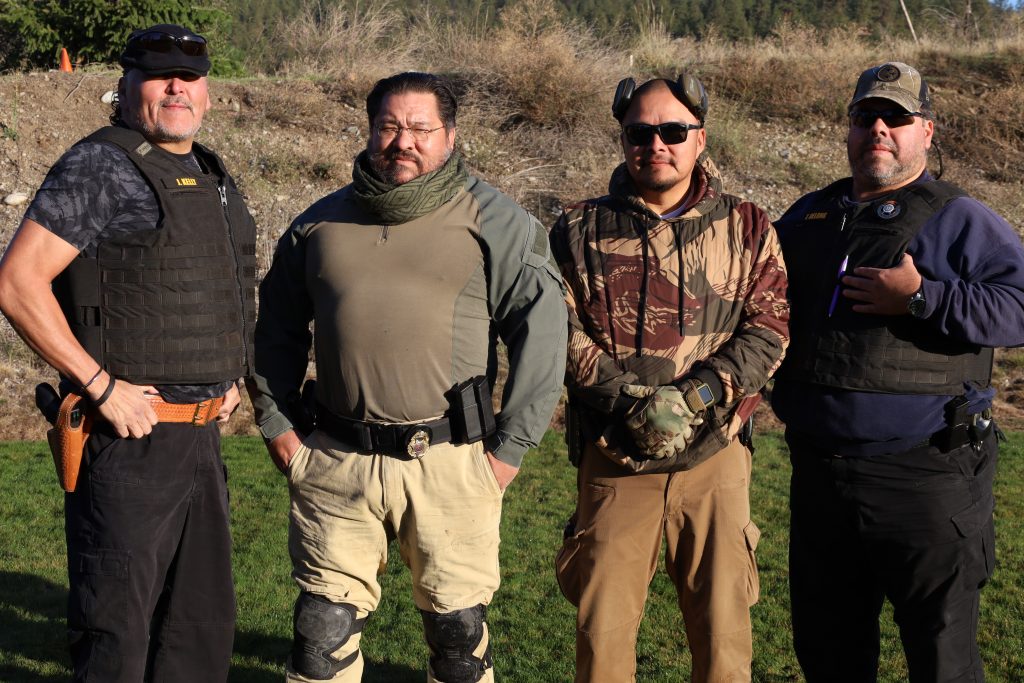
Great Plains Region Shooters– Photo by NAFWS A. Richards
Third place was awarded to the Great Lakes team whose members were Terry Metoxin, Kyle Gunderson, Bobby Robles and Brad Cameron who scored a total of 7969 points.
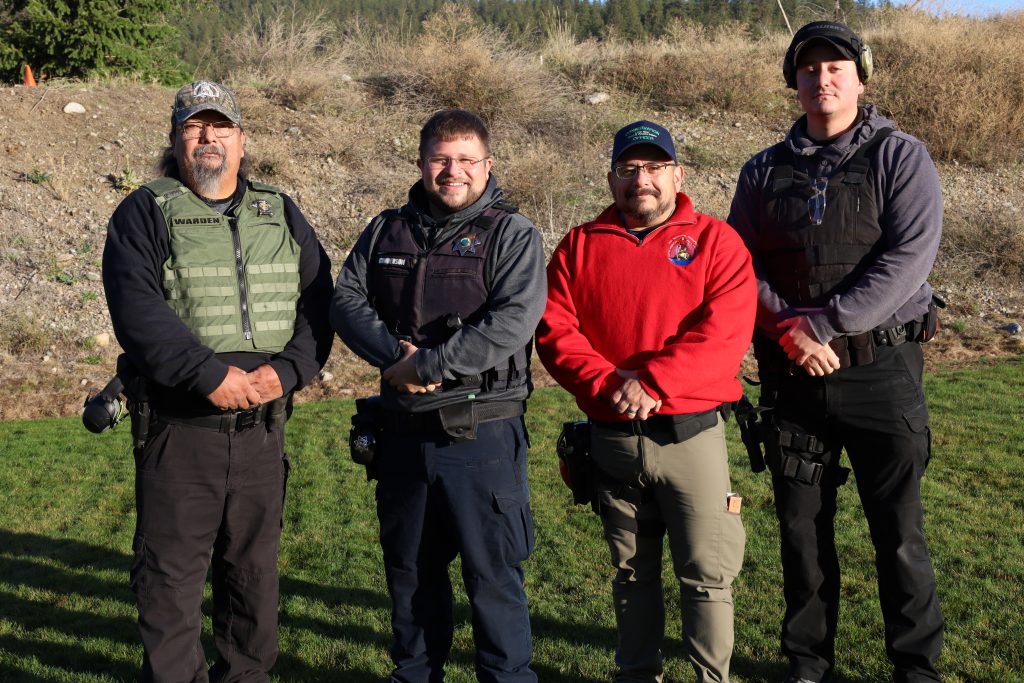
Great Lakes Region Shooters– Photo by NAFWS A. Richards
It was a close competition with teams separated by only 15 and 17 points, respectively!
The overall Top Gun was awarded to Zachary Ashkie who averaged 577 points out of a possible 600 points, which equaled a total score of 1732 and a 96% hit rate.
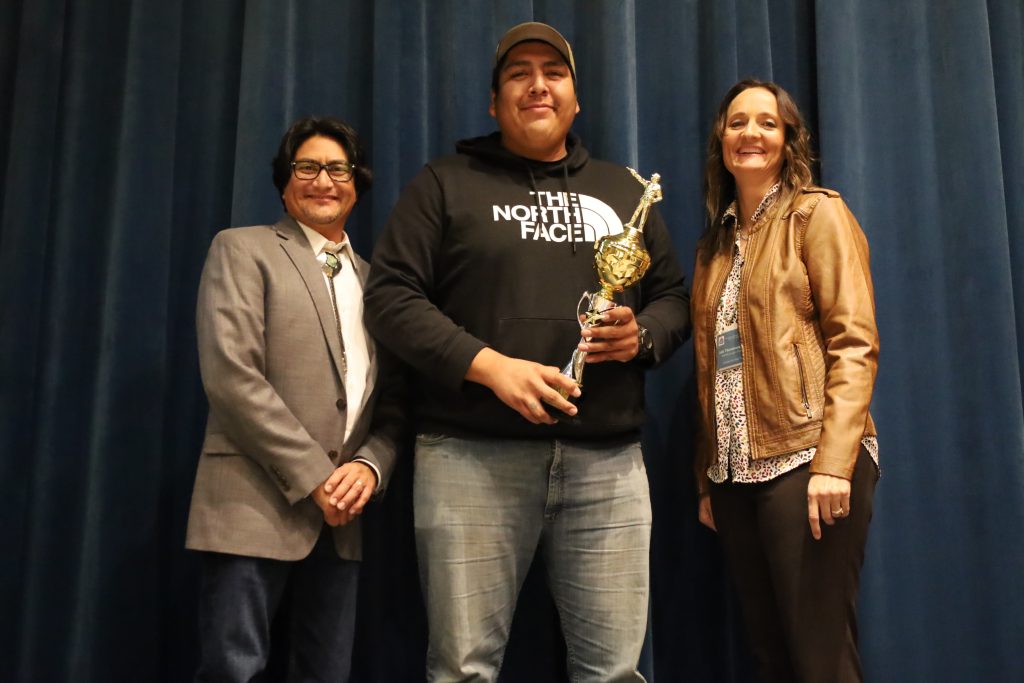
Top Gun Zachary Ashkie – Photo by NAFWS A. Richards
Congratulations to all shooters!
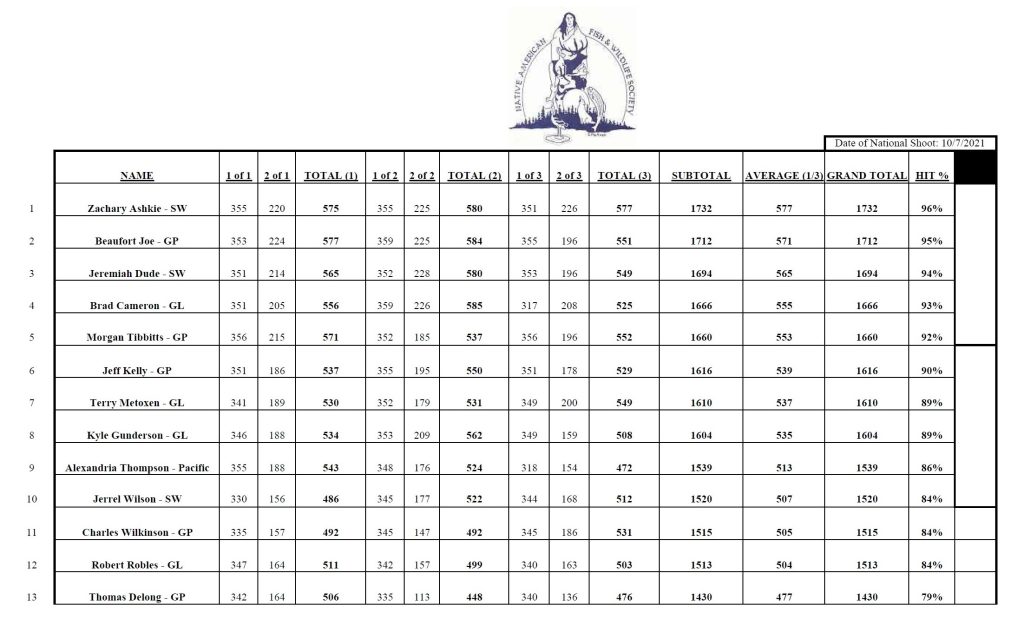
I spent a great amount of time identifying more supervisor contacts and distributing an anonymous conservation law enforcement survey to CLEO managers/supervisors to all applicable Tribes to solicit information directed at specific needs of Tribal CLEO Programs. All data collected will be analyzed and used, internally only, to justify funding needs to support those programs on a national level.
In early December, I presented on Indigenous Rights, Stewardship and Conservation Law Enforcement on Traditional Lands to the INTERPOL Wildlife Crime Working Group (WCWG) who hosted their annual global meeting virtually.
And lastly, I received approval from the BOD to move forward with a formal agreement with the Great Lakes Drone Company who proposed a 2-year work agreement with the NAFWS to provide drone training and technical assistance to Tribal programs on a national level. We hope to have the final agreement soon in place so that we can begin to schedule this highly requested training.
Looking forward – I’ve started planning for 2022 in-person training events and will continue to research virtual training opportunities throughout the year. Please use this link, Events & Training – Native American Fish and Wildlife Society (nafws.org), to find scheduled events.
The Alabama Fire College is currently offering three, 2-day Hazmat Awareness courses in January, February, and March 2022. For those interested in taking the training, follow the registration instruction on the associated flyer.
As always, if you have any questions or concerns about conservation law enforcement, please feel free to contact me.
Fish & Wildlife News: Invasive Species, Wildlife Disease, and Endangered Species
Shoalwater Bay Indian Tribe Calls for State of Emergency on European Green Crab Invasion
The European green crab (Carcinus maenas) is native to European and North African coasts but has spread globally beginning as the early 1800s. Tolerant of diverse temperature and salinity, the crab has established populations on both coasts of North America, Australia, Japan, and South Africa and threatens to spread further. The crab has devastating effects on local ecosystems as it alters habitats through predation and sediment and eelgrass disturbance.
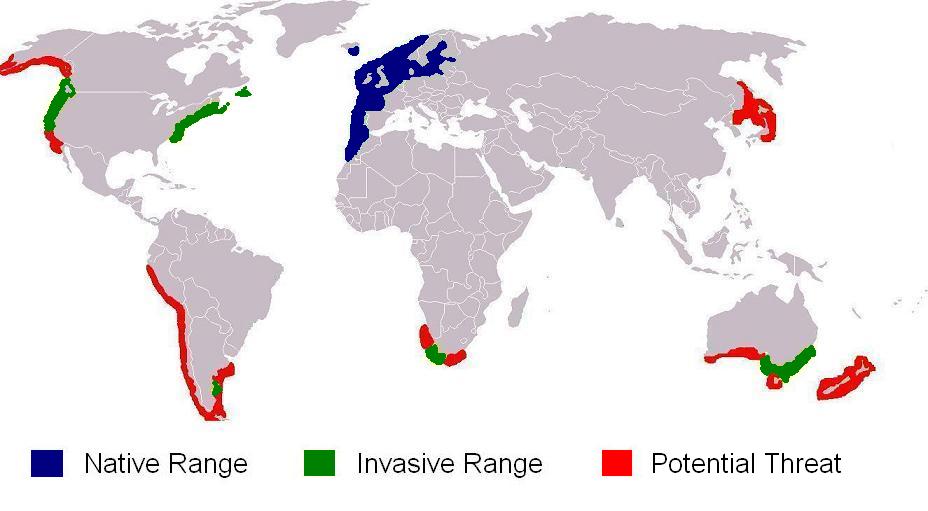
Map of European Green Crab native, invasive and potentially threatened regions. Credit: Greencrab.org
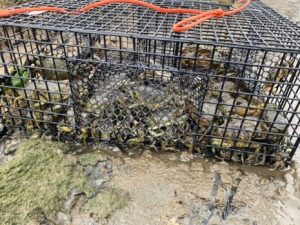
Green crab captured in Willapa Bay by Shoalwater Bay Tribe. Photo credit: Larissa Ritzman
Shoalwater Bay and the larger Willapa Bay of southwestern Washington sustained the ancestors of the Shoalwater Bay Indian Tribe and continues to be crucial for Tribal gathering, fishing, cultural resources, and business. Following the invasion of European green crabs in Willapa Bay, the Shoalwater Bay Tribe Natural Resources and Environment Department joined trapping efforts in 2020. In 2021, the department deployed 535 traps catching 5,965 green crabs.
The Tribe recently signed a state of emergency due to the continuing high catch rates of the invasive crab. In a press release, Department Director Larissa Pfleeger and Natural Resource Specialist Richard Ashley stress the urgency of this situation as they describe their firsthand experience watching biodiversity disappear in regions heavily populated by green crab. The Natural Resource Department is now pursuing long-term funding to expand the trapping and removal program. Read the Shoalwater Bay Tribe press release.
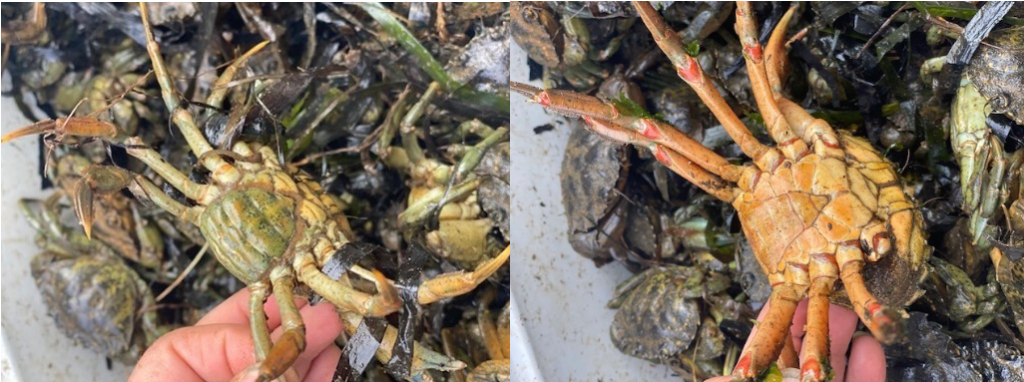
Female (top) and male (bottom) European green crab. Photo credit: Larissa Ritzman
Rabbit Hemorrhagic Disease Continues to Spread
January 7, 2022 – The Florida Department of Agriculture and Consumer Services (FDACS) issued an update confirming cases of Rabbit Hemorrhagic Disease Virus Type 2 (RHDV-2) in domestic rabbits. Florida joins a growing list of states affected by RHDV-2, an extremely contagious and often fatal disease in domesticated and wild rabbits. Read the full FDACS statement here.
Atlantic Pigtoe Mussel Listed as Threatened
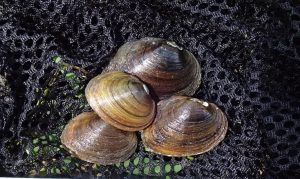 December 17, 2021 – The U.S. Fish and Wildlife Service (USFWS) has made a final determination to list the Atlantic pigtoe mussel as threatened under the Endangered Species Act (ESA). The Atlantic pigtoe (Fusconaia masoni), a small freshwater mussel native to the Atlantic seaboard, can be found in just seven of the 12 river basins it once occupied. Populations in remaining basins are greatly reduced and unstable.
December 17, 2021 – The U.S. Fish and Wildlife Service (USFWS) has made a final determination to list the Atlantic pigtoe mussel as threatened under the Endangered Species Act (ESA). The Atlantic pigtoe (Fusconaia masoni), a small freshwater mussel native to the Atlantic seaboard, can be found in just seven of the 12 river basins it once occupied. Populations in remaining basins are greatly reduced and unstable.
Filter feeders, such as the Atlantic pigtoe mussel, serve as an indicator of declining water quality and suitable habitat. Pollution and reduced water quality can directly kill the Atlantic pigtoe and sedimentation (sediment suspended in the water column) can make it difficult for the mussel to feed and cause suffocation. Additionally, dams disrupt natural flow patterns, increase water temperatures, eliminate habitat, and prevent mussels from moving upstream. Following the listing of Atlantic pigtoe as threatened, USFWS has designated critical habitat in the seven areas of Virginia and North Carolina where the mussel has maintained populations. Read more from USFWS.
We Are Hiring!
NAFWS is now accepting applications for a Director of Programs and Senior Tribal Climate Resilience Liaison (TCRL) for the Alaska Region. The Director of Programs will supervise a growing team of fish & wildlife biologists and project coordinators. Applications are due Jan 21, 2022. The Senior TCRL will lead a team of two assistant TCRLs and a seasonal Alaska Native Intern to assist Alaska Native communities prepare for and respond to climate impacts. The application deadline has been extended to Jan 31, 2022.
Several additional positions will be announced in the coming months. Check the NAFWS job board and follow us on social media for openings.
Membership Updates – Join NAFWS!!!
Heidi McCann, Office Manager & Membership Coordinator
Happy New Year Everyone!! 2022 is here and though 2021 may not have been the year we thought it might be here we are.
We are looking forward to an exciting year for NAFWS as we continue to focus on building our membership and adding value to the membership services. In 2022, we will continue to hold trainings and webinars both virtually and in-person. While we were happy to offer many of our trainings free in 2021, please know that we will require a registration fee for some of our trainings if you or your Tribe is not a current member in 2022.
Membership benefits will include trainings, discounts on conference registration, and a subscription to the Eagles Nest newsletter. Additionally, this year we are featuring individual members and member Tribes on our website, newsletter, and social media accounts so please don’t be shy and let us know what is happening in your part of Turtle Island.
Be sure to check the website and follow us on social media for information about upcoming events. Watch your email and mail for membership information or visit our website at: https://nafws.org/about-nafws/membership.


